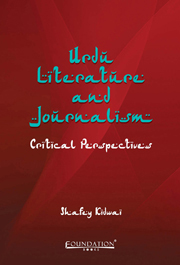Book contents
- Frontmatter
- Dedication
- Contents
- Preface
- Introduction
- Acknowledgements
- 1 Post-Independence Urdu Short Story
- 2 Post-Partition Urdu Poetry
- 3 Structuralism and Post-structuralism in Urdu Criticism
- 4 Jayant Parmar
- 5 Firaq as a Critic
- 6 Ghalib Criticism
- 7 Literature, Culture and Social Consciousness
- 8 The Influence of Tagore on Urdu Literature
- 9 Early Journalistic Endeavours of Sir Syed Ahmad Khan
- 10 Pioneering the First Urdu Book on Journalism
- 11 The Contribution of Urdu Journalists to the First War of Independence
- 12 Abul Kalam Azad's Journalistic Conquests
- Index
5 - Firaq as a Critic
Published online by Cambridge University Press: 05 October 2014
- Frontmatter
- Dedication
- Contents
- Preface
- Introduction
- Acknowledgements
- 1 Post-Independence Urdu Short Story
- 2 Post-Partition Urdu Poetry
- 3 Structuralism and Post-structuralism in Urdu Criticism
- 4 Jayant Parmar
- 5 Firaq as a Critic
- 6 Ghalib Criticism
- 7 Literature, Culture and Social Consciousness
- 8 The Influence of Tagore on Urdu Literature
- 9 Early Journalistic Endeavours of Sir Syed Ahmad Khan
- 10 Pioneering the First Urdu Book on Journalism
- 11 The Contribution of Urdu Journalists to the First War of Independence
- 12 Abul Kalam Azad's Journalistic Conquests
- Index
Summary
Much ink has been expended over the artistic felicity and aesthetic acuteness of Raghupati Sahay Firaq Gorakhpuri (1896–1982) – one of the most admired poets of the subcontinent, who was also instrumental in transforming Urdu love poetry into a repository receptacle of multi-layered human consciousness that transcends the time and space barrier. Surprisingly, his wide-ranging, wholesome, discerning and equally forceful prose, containing a meticulous and candid, critical insight has hardly been subjected to dispassionate and assiduous evaluation.
Seldom do Urdu scholars and critics focus on Firaq's perceptive and sharp-witted criticism, which he practiced for almost three decades. There is no denying the fact that some Urdu critics have cursorily referred to his three books Andaze (1959), Urdu Ki Eshqia Shairi (1945) and Urdu Ghazal Goiee (1955) but they peremptorily describe him as the impressionistic critic, whose critical evaluation is based on interpreting the text in the backdrop of human emotions and impressions and who concentrates on conveying initial and stock responses which a piece of art may evoke. He takes pride in recreating the experience of the author, in the minds of the readers.
The onus of propagating such a mistaken notion rests with Firaq himself, who, on several occasions, including in the preface to ‘Andaze’, showed his penchant for impressionistic and aesthetic criticism. Firaq disagrees with the widely-accepted literary assumption that the spontaneous appreciation of poetry or the acclamation that a poet gets at any poetic symposium falls well short of criticism and most of the time, this sort of quick assessment proves to be misleading and erroneous.
- Type
- Chapter
- Information
- Urdu Literature and JournalismCritical Perspectives, pp. 87 - 94Publisher: Foundation BooksPrint publication year: 2014



